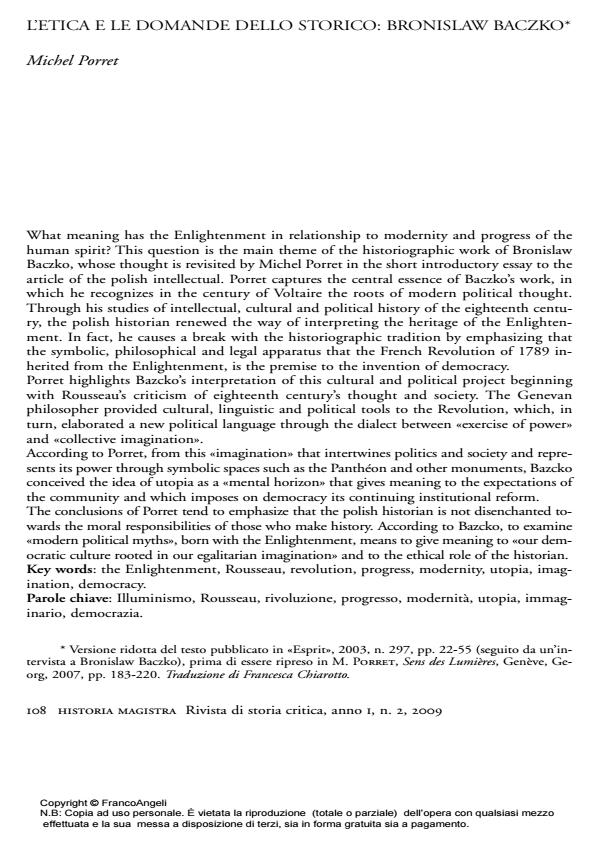L'etica e le domande dello storico: Bronislaw Baczko
Journal title HISTORIA MAGISTRA
Author/s Michel Porret
Publishing Year 2009 Issue 2009/2
Language Italian Pages 8 P. 108-115 File size 105 KB
DOI 10.3280/HM2009-002010
DOI is like a bar code for intellectual property: to have more infomation
click here
Below, you can see the article first page
If you want to buy this article in PDF format, you can do it, following the instructions to buy download credits

FrancoAngeli is member of Publishers International Linking Association, Inc (PILA), a not-for-profit association which run the CrossRef service enabling links to and from online scholarly content.
L'etica e le domande dello storico: Bronislaw Baczko - What meaning has the Enlightenment in relationship to modernity and progress of the human spirit? This question is the main theme of the historiographic work of Bronislaw Baczko, whose thought is revisited by Michel Porret in the short introductory essay to the article of the polish intellectual. Porret captures the central essence of Baczko’s work, in which he recognizes in the century of Voltaire the roots of modern political thought. Through his studies of intellectual, cultural and political history of the eighteenth century, the polish historian renewed the way of interpreting the heritage of the Enlightenment. In fact, he causes a break with the historiographic tradition by emphasizing that the symbolic, philosophical and legal apparatus that the French Revolution of 1789 inherited from the Enlightenment, is the premise to the invention of democracy. Porret highlights Bazcko’s interpretation of this cultural and political project beginning with Rousseau’s criticism of eighteenth century’s thought and society. The Genevan philosopher provided cultural, linguistic and political tools to the Revolution, which, in turn, elaborated a new political language through the dialect between «exercise of power» and «collective imagination». According to Porret, from this «imagination» that intertwines politics and society and represents its power through symbolic spaces such as the Panthéon and other monuments, Bazcko conceived the idea of utopia as a «mental horizon» that gives meaning to the expectations of the community and which imposes on democracy its continuing institutional reform. The conclusions of Porret tend to emphasize that the polish historian is not disenchanted towards the moral responsibilities of those who make history. According to Bazcko, to examine «modern political myths», born with the Enlightenment, means to give meaning to «our democratic culture rooted in our egalitarian imagination» and to the ethical role of the historian.
Key words: the Enlightenment, Rousseau, revolution, progress, modernity, utopia, imagination, democracy.
Parole chiave: Illuminismo, Rousseau, rivoluzione, progresso, modernità, utopia, immaginario, democrazia.
Michel Porret, L'etica e le domande dello storico: Bronislaw Baczko in "HISTORIA MAGISTRA" 2/2009, pp 108-115, DOI: 10.3280/HM2009-002010